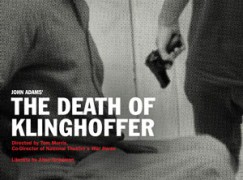‘I haven’t seen it, but here’s what I think’
mainThere’s a whole new breed of opera commentators who spout before they see.
Lots of them about The Death of Klinghoffer. Here’s one.


There’s a whole new breed of opera commentators who spout before they see.
Lots of them about The Death of Klinghoffer. Here’s one.

In a Telegraph interview with Nicholas Kenyon, Dudamel…

Bavarian Radio is claiming him as a local…

The orchestra has cancelled concerts until after the…

The Russian-born soprano Olga Peretyatko has a habit…

Session expired
Please log in again. The login page will open in a new tab. After logging in you can close it and return to this page.
Like many American commentators, Adler doesn’t acknowledge that there are various types of terrorism. One includes the desperate acts of asymmetrical warfare. Another includes state terrorism such as enacted by Hitler, Stalin, and the Taliban. The most pervasive form of terrorism the world has ever known was the mutually assured destruction created by the nuclear arsenals of the USA and Soviet Union during the cold war. Even the highly intimidating atmospheres created by McCarthyism could reasonable be included in forms of political terror. Without understanding the many types of terrorism, it will be difficult to end it. It was exactly these over-simplified concepts Adams and Goodman tried to avoid. And on a more technical level, it’s also the difference between drama and melodrama.
We should remember that the Adams/Goodman opera has also been attacked by Palestinians. When British director Penny Woolcock arrived at a Palestinian film festival after having been invited to screen her film of the opera, she was told she couldn’t show it because it was thought to be pro-Jewish and anti-Palestinian. After 70 years of bitter war, neither side welcomes a bi-partisan view. They want a melodrama that presents their over-idealized view of the world. Given our human weaknesses, it’s hard to blame them.
For me, the real story isn’t so much about Adams, but rather the librettist Alice Goodman, a midwestern jewish woman who became an Anglican priest, and whose brilliant writing career was destroyed by the scandals surrounding “Klinghofer.” Adams was able to continue by writing mostly abstract music, but Goodman became uncommissionable. One of the reasons opera has come close to being a dead art form is the loss of the art of the librettist — which plays a far greater role in opera than even most professionals realize. Before her career was stopped, Goodman came close to reviving the field.
After “Nixon In China” and “Klinghofer,” she planned a third opera to complete a trilogy. It was to be entitled “Waco” and deal with the 1993 gun battle between the Branch Davidian sect and US agents in which 76 people died. Goodman planned for a children’s chorus (many children were burned alive in the battle) and Janet Reno was to be a principal character.” Reno was the Attorney General at the time and gave the order for the disastrous attack.
Goodman also hoped to write a libretto about the Elian Gonzalez affair — a Cuban boy rescued from shark-infested waters in late 1999 after his mother drowned in an attempt to escape Cuba for the US. During his months in Florida, attempts by his father to get him back were violently resisted. There were also claims that Elian started working miracles during his time in America. (Whew! That all sounds like an opera.)
The loss of these librettos demonstrates the cultural damage created by censorship and ostracism. Oddly, I sent a comment including the above information about Goodman’s planned projects to NewMusicBox (a website that promotes American new music) but it was blocked by the moderators.
I think another danger of the censorship might ironically be an anti-Semitic backlash. Based on my limited observation, very few Jews support the cancellation of the broadcasts, and many in fact find it appalling. The Jewish community is NOT responsible for the cancellation. It’s so easy to jump to conclusions about people and dehumanize them by assuming they act as a monolithic group when in reality they almost never do. Like the way we paint Islam through the actions of a small number of radicals. It is ironic that one of the greatest understandings given to us by the Abrahamic religions is that every human is complex beyond our understanding — a view that Adams and Goodman at least tried to reflect in their work.
If opera libretti need such sensationalist newspaper cuttings to get some ‘drama’ in a production, there’s really something quite wrong with the genre. With the loss of an operatic musical language, this immense vacuum has to be filled-up by sensation of another nature than the music. Opera is, however, not about the particulars of the plot but about how music explores human experiences, and that means that the plot can be simple and universal if handled by a talented composer who employs an operatic style. History shows that operas survived because of this musical exploration, not because of the plots.
Current events, such as in Dante’s “Divine Comedy,” can add interesting dimensions to an art work — especially in a genre as moribund as opera.
Opera is not moribund. See the latest news about the Vienna State Opera…. it is merely sleeping at places where staff does not quite understand what the art form is and what it needs. What is moribund, is the attempt of directors to impose inessential elements to a work of art that was conceived as a whole. Nobody would want to add contemporary newspaper culttings to Dante’s Divine Comedy and claim that the work has been improved upon. If Dante includes contemporary elements, it is his conttemporary thing, and his responsibility alone, and the same goes for Mozart, Verdi, Wagner, Berg etc. As soon as a work has been finished, it should not be tampered with – which is a sign of contempt for the composer and librettist.
Actually, to be fair to Village Voice blogger David R. Adler, his bile is directed less against the opera than against John Adams himself. Adler, at least, takes pains to say that he will reserve judgement on the opera itself until he’s seen it, unlike Abraham Foxman, who is the truly intellectually invalid and foolish case of condemning the opera without seeing it. Adler aims his rhetoric elsewhere, at ‘the messenger’, in a manner of speaking.
It is an excellent article, and Adams cuts a despicable figure. Indeed it is an outrage to paint terrorists as victims, and Adams is not alone in this:
‘Von Rhein calls Klinghoffer “a nuanced meditation on Middle East violence and religious intolerance that examines the social, economic and political conditioning that drives such acts of unspeakable inhumanity.” ‘ Such acts are merely driven by a level of unimaginable barbarism. There is no excuse for it and it is very embarrassing to see an artist, living in an area where he is safe from such atrocities, taking a ‘soft’ stance to such barbarians.
Such ‘operas’ are merely attempts to use controversial and sensationalist factors to compensate for the lack of real human substance. Adams’ utterances prove the point.
As von Rhein notes, the opera explores the inner dimensions of what drives humans to violence (such as a propensity for simplistic, absolutist thinking…) That is something different than portraying terrorists as victims.
So far, there is no censorship in Met’s actions.
Is preventing bad cultural products a wide distribution ‘censorship’? The boundaries are vague. At the beginning of the last century, Strauss’ “Salome”, a very tasteless sensationalist plot with brilliant music, was censored in England and at the Vienna State Opera. Reading this for the first time, my first reaction was a mild, modern indignation; but after having seen some productions in which the distasteful and abject was inflated to grotesque proportions, with blood all over the place, naked body builder headsmen, unlikely pyrotechnics with the severed head, etc. etc., I began to feel sympathy for the early censorship. Tickling the sensationalist needs of a spoiled, dulled audience, does not seem the best way of stimulating interest in high culture.